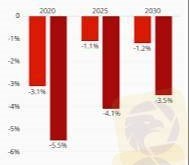
2025-02-15 02:54
Na indústriaThe Effects of Brexit on Forex Economic Trends
#firstdealofthenewyearastylz
Brexit has had significant and lasting effects on foreign exchange (Forex) economic trends, particularly impacting the British pound (GBP) and the euro (EUR). Here are the key effects:
1. Volatility in GBP
Since the 2016 Brexit referendum, the GBP has experienced increased volatility.
Major events, such as the UK-EU negotiations and the final trade deal, triggered sharp fluctuations in the pound’s value.
The GBP dropped nearly 10% against the USD on the day of the referendum, its biggest one-day fall in history.
2. Long-term Depreciation of GBP
The pound has generally remained weaker compared to pre-Brexit levels, making UK exports cheaper but increasing import costs.
Investor uncertainty about the UK's economic future has contributed to reduced foreign investment, further pressuring GBP.
3. Impact on the Euro (EUR)
Brexit also caused instability for the euro, as the UK was one of the EU’s biggest economies.
Although the euro was less affected than the pound, investor concerns about EU economic stability led to periodic declines.
4. Reduced Liquidity in FX Markets
London was a global forex trading hub, but Brexit led some financial institutions to shift operations to other EU cities (e.g., Frankfurt and Paris).
This shift has reduced liquidity in GBP trading and increased costs for forex transactions.
5. Trade Disruptions and Exchange Rate Impact
New trade barriers and reduced EU-UK trade volumes have influenced currency movements.
The GBP’s value has been sensitive to trade data and supply chain disruptions, affecting forex trends.
6. Interest Rate and Inflation Effects
Brexit-related inflation has led the Bank of England (BoE) to raise interest rates, influencing forex markets.
Higher interest rates have occasionally supported GBP, but inflation-driven economic uncertainty has offset these gains.
7. Shift in Safe-Haven Currencies
Brexit uncertainty increased demand for safe-haven currencies like the USD, JPY, and CHF.
This shift caused temporary declines in both GBP and EUR during uncertain periods.
Conclusion
Brexit has led to sustained forex market volatility, a weaker GBP, and changes in trading dynamics. The long-term effects continue to unfold, with forex traders closely watching UK-EU trade relations, economic policies, and global market conditions.
Gostar 0

General Solo
Mga brokers
Discussões populares
Análise de mercado
Brasileiros FX
Análise de mercado
Brasileiros no FOREX
Análise de mercado
Don't buy Bitcoin now! Look at my review and description in the print!
Análise de mercado
análises do mercado financeiro ao vivo confira
Na indústria
Não consegui sacar meus peofits
Na indústria
Não é possível retirar
Categoria do mercado

Plataforma

Exibições

IB

Recrutamento

EA

Na indústria

Mercado

Índice
The Effects of Brexit on Forex Economic Trends
 Hong Kong | 2025-02-15 02:54
Hong Kong | 2025-02-15 02:54#firstdealofthenewyearastylz
Brexit has had significant and lasting effects on foreign exchange (Forex) economic trends, particularly impacting the British pound (GBP) and the euro (EUR). Here are the key effects:
1. Volatility in GBP
Since the 2016 Brexit referendum, the GBP has experienced increased volatility.
Major events, such as the UK-EU negotiations and the final trade deal, triggered sharp fluctuations in the pound’s value.
The GBP dropped nearly 10% against the USD on the day of the referendum, its biggest one-day fall in history.
2. Long-term Depreciation of GBP
The pound has generally remained weaker compared to pre-Brexit levels, making UK exports cheaper but increasing import costs.
Investor uncertainty about the UK's economic future has contributed to reduced foreign investment, further pressuring GBP.
3. Impact on the Euro (EUR)
Brexit also caused instability for the euro, as the UK was one of the EU’s biggest economies.
Although the euro was less affected than the pound, investor concerns about EU economic stability led to periodic declines.
4. Reduced Liquidity in FX Markets
London was a global forex trading hub, but Brexit led some financial institutions to shift operations to other EU cities (e.g., Frankfurt and Paris).
This shift has reduced liquidity in GBP trading and increased costs for forex transactions.
5. Trade Disruptions and Exchange Rate Impact
New trade barriers and reduced EU-UK trade volumes have influenced currency movements.
The GBP’s value has been sensitive to trade data and supply chain disruptions, affecting forex trends.
6. Interest Rate and Inflation Effects
Brexit-related inflation has led the Bank of England (BoE) to raise interest rates, influencing forex markets.
Higher interest rates have occasionally supported GBP, but inflation-driven economic uncertainty has offset these gains.
7. Shift in Safe-Haven Currencies
Brexit uncertainty increased demand for safe-haven currencies like the USD, JPY, and CHF.
This shift caused temporary declines in both GBP and EUR during uncertain periods.
Conclusion
Brexit has led to sustained forex market volatility, a weaker GBP, and changes in trading dynamics. The long-term effects continue to unfold, with forex traders closely watching UK-EU trade relations, economic policies, and global market conditions.
Gostar 0
Também quero comentar.
Perguntar
0Comentários

Ainda não há comentários. Faça o primeiro.

Perguntar
Ainda não há comentários. Faça o primeiro.